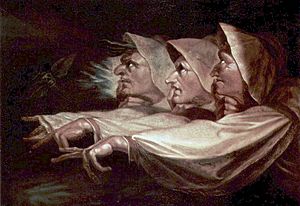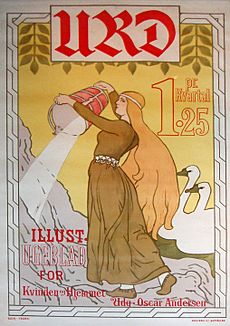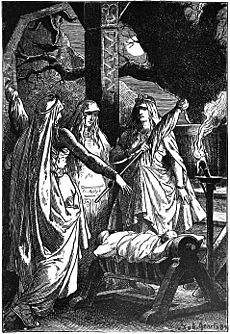Wyrd facts for kids
Wyrd is an old word from Anglo-Saxon times, which was a long time ago in England. It's like saying "fate" or "destiny." It means what is meant to happen to someone or something.
Today, we use the word "weird" to mean something strange or unusual. But a long time ago, "weird" was connected to "wyrd" and had to do with things that controlled destiny.
In Old Norse (an old language from Scandinavia), there's a similar word called urðr. This word also means fate. It's also the name of Urðr (or Urd), who is one of the Norns in Norse mythology. The Norns are powerful beings who decide the fate of everyone. There's even a special well called Urðarbrunnr where the Norns meet.
Contents
What Does Wyrd Mean?
The word wyrd comes from an even older language called Proto-Germanic. Many words in different languages are related to it, like wurd in Old Saxon and wurt in Old High German. The Dutch word worden (meaning "to become") and the German word werden also come from the same root.
The original meaning of the root word was "to twist" or "to turn." In Proto-Germanic, it meant "to come to pass" or "to become." So, "wyrd" is about things that happen or come into being.
How "Weird" Changed Over Time
The word "wyrd" was a noun, like a thing or a concept. But around the 1400s, people started using it as an adjective (a describing word). This happened especially with the "Weird Sisters." These were like the classical Fates, who were goddesses that controlled destiny. Later, they were seen as fairies in England.

A famous example of the "Weird Sisters" is the Three Witches in William Shakespeare's play Macbeth. Many people who study the play explain that "Weird Sisters" here means "Fate Sisters."
The modern spelling "weird" became common in the 1600s. Its most common meaning today, "odd" or "strange," first appeared in the early 1800s. At first, it still had a bit of a supernatural feeling, but now it's used for everyday strange things.
Fate in Old Germanic Stories
In old Germanic stories, the idea of fate was very important. Some people believe that Wyrd was seen as a goddess of fate before Christianity came to England. This is because its Norse relative, urðr, is the name of one of the Norns, who are goddesses.
However, some experts disagree. They think that while "wyrd" might have been a deity long ago, it wasn't seen as a goddess in the Anglo-Saxon period. They also suggest that the idea of three Norns might have been influenced by the three Moirai (Fates) from Greek and Roman mythology.
The Norns and Their Weaving
The Norns have three names: Urðr, Verðandi, and Skuld.
- Urðr means "that which has come to pass" (the past).
- Verðandi means "that which is happening" (the present).
- Skuld means "debt" or "what should be" (the future).
The Norns are said to weave the threads of fate, or ørlǫg. This word means "beyond law" or "what is set out." In an old poem called Voluspa, it says the Norns "set up the laws" and "decided on the lives of the children of time." This means they decided what would happen to people.
Even the god Frigg "knows all ørlǫg," but she doesn't tell anyone. Sometimes, things are described as "lawless" or "without ørlǫg." For example, in Voluspa, driftwood is given life by gods to create the first humans, Ask and Embla. This driftwood was "lawless" before it was given a destiny.
Wyrd in Old English Poems
The word wyrd appears in many old English poems.
- In The Wanderer, it says, "Wyrd bið ful aræd" which means "Fate remains wholly inexorable" (meaning it cannot be stopped).
- In Beowulf, it says, "Gæð a wyrd swa hio scel!" which means "Fate goes ever as she shall!"
In The Wanderer, wyrd is shown as powerful and unstoppable. It "snatches the earls away from the joys of life" and "the wearied mind of man cannot withstand her." This shows how strong and unchangeable fate was believed to be.
Wyrd Today
The idea of wyrd is still important in modern Germanic Heathenry, which is a new religious movement that looks back to old Germanic beliefs.
Other Uses of Wyrd
- There's a mountain on the planet Venus called Wyrd Mons. It's named after an "Anglo-Saxon weaving goddess."
- In Frank Herbert's science fiction novel Dune, the word "weird" is used to mean power. For example, a fighting style is called "the Weirding Way."
- In the 1984 movie version of Dune, this was changed to "weirding modules," which were sonic weapons.
See also
- Amor fati
- Beot
- Destiny
- Karma
- Kismet
- Moirai
- Predestination
- Ṛta
- Teotl
- Weaving (mythology)
 | Calvin Brent |
 | Walter T. Bailey |
 | Martha Cassell Thompson |
 | Alberta Jeannette Cassell |



